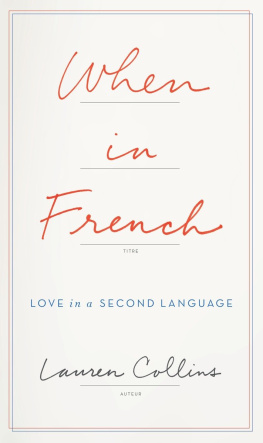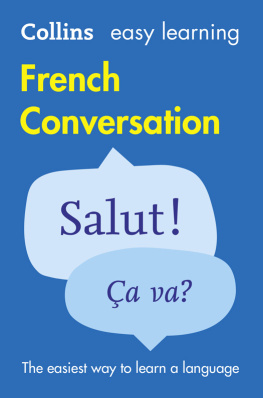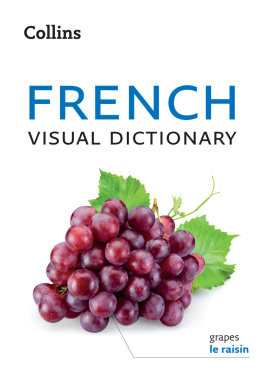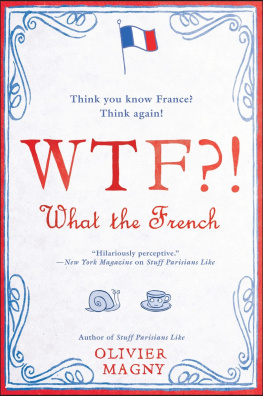PENGUIN PRESS
An imprint of Penguin Random House LLC
375 Hudson Street
New York, New York 10014
penguin.com

Copyright 2016 by Lauren Collins
Penguin supports copyright. Copyright fuels creativity, encourages diverse voices, promotes free speech, and creates a vibrant culture. Thank you for buying an authorized edition of this book and for complying with copyright laws by not reproducing, scanning, or distributing any part of it in any form without permission. You are supporting writers and allowing Penguin to continue to publish books for every reader.
Excerpt from For Me... For-mi-da-ble, original French text by Jacques Plante, music by Charles Aznavour. Copyright 1963 (renewed) Editions Musicales Charles Aznavour, Paris, France. TRO-Hampshire House Publishing Corp., New York, controls all publication rights for the United States and Canada.
LIBRARY OF CONGRESS CATALOGING-IN-PUBLICATION DATA
Names: Collins, Lauren (Journalist)
Title: When in French : love in a second language / Lauren Collins.
Description: New York : Penguin Press, 2016.
Identifiers: LCCN 2016017611 | ISBN 9781594206443 (hardback) | ISBN 9780698191075 (e-book)
Subjects: LCSH: Collins, Lauren (Journalist) | JournalistsUnited StatesBiography. | Travelers writings, AmericanFrance. | French languageConversations and phrasesEnglish. | French languageSelf-instruction. | French languageStudy and teachingEnglish speakers. | FranceLanguages. | BISAC: BIOGRAPHY & AUTOBIOGRAPHY / Literary. | TRAVEL / Europe / France. | HUMOR / Topic / Marriage & Family. Classification: LCC PN4874.C646 A3 2016 | DDC 448.0092 [B]dc23 LC record available at https://lccn.loc.gov/2016017611
Penguin is committed to publishing works of quality and integrity. In that spirit, we are proud to offer this book to our readers; however, the story, the experiences, and the words are the authors alone.
Version_1
For Olivier
You are the one for me, for me, for me, formidable
But how can you
See me, see me, see me, si minable
Je ferais mieux daller choisir mon vocabulaire
Pour te plaire
Dans la langue de Molire
Charles Aznavour, For Me, For-mi-da-ble
Contents
One
THE PAST PERFECT
Le Plus-que-parfait
I HADNT WANTED to live in Geneva. In fact, I had decisively wished not to, but there I was. Plastic ficuses flanked the entryway of the building. The corrugated brown carpet matched the matte brown fretwork of the elevator cage. The ground floor hosted the offices of a psychiatrist and those of an iridologuea practitioner of a branch of alternative medicine that was popularized when, in 1861, a Hungarian physician noticed similar streaks of color in the eyeballs of a broken-legged man and a broken-legged owl. Our apartment was one story up.
The bell rang. Newlywed and nearly speechless, I cracked open the door, a slab of oak with a beveled brass knob. Next to it, the landlord had installed a nameplate, giving the place the look less of a home than of a bilingual tax firm.
A man stood on the landing. He was dressed in blackT-shirt, pants, tool belt. A length of cord coiled around his left shoulder. In his right hand, he held a brush. Creosote darkened his face and arms, extending his sleeves to his fingernails and the underside of his palms. A red bandanna was tied around his neck. He actually wore a top hat. I hesitated before pushing the door open further, unsure whether I was up against a chimney sweep or some sort of Swiss strip-o-gram.
Bonjour, I said, exhausting approximately half of my French vocabulary.
The man, remaining clothed, returned my greeting and began to explain why he was there. His words, though I couldnt understand them, jogged secondhand snatches of dialogue: per cantonal law, as the landlord had explained to my husband, who had transmitted the command to me, we had to have our fireplace cleaned once a year.
I led the chimney sweep to the living room. It was dominated by the fireplace, an antique thing in dark striated marble, with pot hooks and a pair of side ducts whose covers hinged open like lockets. Shifting his weight onto one leg with surprising grace, the chimney sweep leaned forward and stuck his head under the mantel. He poked around for a few minutes, letting out the occasional wheeze. Coming out of the arabesque, he turned to me and began, again, to speak.
On a musical level, whatever he was saying sounded cheerful, a scale-skittering ditty of les and las. Perhaps he was admiring the condition of the damper, or welcoming me to the neighborhood. He reached into his pocket, proffering a matchbook and a disc of cork. Then he disappeared.
Minutes went by as I examined his gifts. They seemed like props for a magic trick. More minutes passed. I launched into a version of rock, scissors, paper: since the cork couldnt conceivably do anything to the matches, then the matches must be meant to light the cork. Action was required, but I feared potentially incinerating the chimney sweep, who, I guessed, was making some sort of inspection up on the roof.
Eventually he returned, chirping out some more instructions. I performed a repertoire of reassuring eyebrow raises and comprehending head nods. He scampered away. I still had no idea, so I lit a match, held it to the cork, and tossed it behind the grate. The pile started smoking and hissing. After a few seconds, I lost my nerve and snuffed it out.
The chimney sweep resurfaced, less jolly. He had appointed an assistant who, it appeared, was actively thwarting his routine. This time he spoke in the supple, obvious tones one reserves for madwomen, especially those in possession of flammable objects. Reclaiming the half-charred piece of cork, he lit a fire and, potbelly jiggling, sprinted back out the door.
Finally, he returned and reportedI assume, since we used the fireplace without incident all that winterthat everything was in order.
Au revoir! I said, trying to regain his confidence, and my standing as chatelaine of this strange, drab domain. Hello and good-bye were a pair of bookends, propping up a vast library of blank volumes, void almanacs, novels full of sentiment I couldnt apprehend. It felt as though the instruction manual to living in Switzerland had been written in invisible ink.
I HAD MOVED to Geneva a month earlier to be with my husband, Olivier, who had moved there because his job required him to. My restaurant French was just passable. Drugstore French was a stretch. IKEA French was pretty much out of the question, meaning that, since Olivier, a native speaker, worked twice as many hours a week as Swiss stores were open, we went for months without things like lamps.
He had already been living in Geneva for a year and a half. Meanwhile, I had remained in London, where wed met. The commute was tolerable, then tiring. In the spring of 2013, as our wedding approached, it was becoming a drag. Finally, that June, a visa fiasco abruptly forced me to leave England. Memoirs of immigration, like memories of immigration, often begin with a sense of approachthe ship sailing into the harbor, the blurred countryside through the windows of a train. My arrival in Geneva, on British Airways, was a perfect anticlimax, the modern ache of displacement anesthetized amid blank corridors of orange liqueur and fountain pens.



















